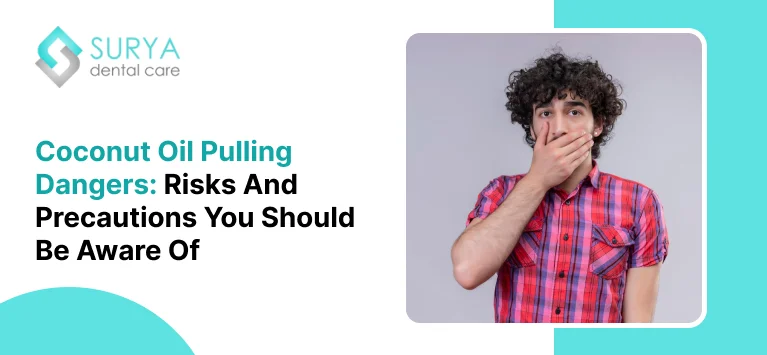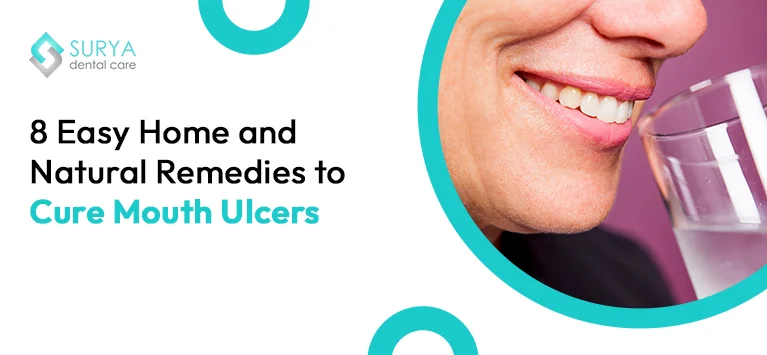Oil pulling is an ancient practice followed in ayurvedic medicine where you will Swish the edible oil around your mouth. Most people online trend that oil pulling makes your teeth whitening, prevents gum disease, prevents bad breath, and strengthens your gums. Also, most of the lifestyle influencers on social media suggest oil pulling. This makes most people believe that oil pulling improves their oral hygiene and health. But in reality, there are some coconut oil-pulling dangers that are listed in this article.
Read more to know about the safe and unsafe scenarios of oil pulling along with the benefits of oil pulling. Thus, this article helps you to understand how to follow this ancient practice very safely and benefit.
What is oil pulling?
Oil pulling is an ayurvedic practice followed to maintain oral hygiene in the ancient days to remove bacteria and stimulate saliva production. In oil pulling, one teaspoon of oil is swished around the mouth as the first thing in your morning for around 20 minutes, and after you are done pulling, spit it out. Oil pulling can be done using coconut oil, sesame oil, or olive oil.
- Coconut Oil: It is popular due to its taste, availability, and high lauric acid content.
- Sesame Oil: Traditional in Ayurveda, known for its antioxidant and anti-inflammatory benefits.
- Olive Oil: Another option with antimicrobial and moisturizing properties.
But in recent days, the easy availability of coconut oil, the taste, and the presence of lauric acid in coconut oil have made it the go-to oil for your oil pulling. So, we have discussed coconut oil pulling benefits and dangers in this article.
Benefits of Coconut Oil Pulling
The benefits of oil pulling have been based on limited scientific evidence, and we have explained all of them below,
Reduces Harmful Bacteria
The mouth is home to hundreds of bacterial species, and these bacteria need to be cleared because harmful bacteria like Streptococcus mutans could contribute to tooth decay and plaque buildup. Oil-pulling practice can help you eliminate such harmful bacteria to prevent a tooth infection.
Improves Bad Breath
Bad breath or halitosis is often caused by odor-producing bacteria in the mouth. So, by using oil-pulling practice, you can reduce bacteria and freshen your breath.
Supports Gum Health
Oil pulling is believed to reduce inflammation and fight bacteria that cause gum diseases such asgingivitis. Regular use may promote healthier gums over time. A comparative study shows that coconut oil is very effective when compared to sesame oil in reducing the severity of gingivitis.
Prevents Cavities
Through oil pulling you can reduce the bacterial load in the mouth, which helps to prevent the formation of cavities even though it does not replace brushing and flossing. But it can act as a supplementary measure.
May Whiten Teeth
One of the most talked about benefits on and around the internet is that oil pulling whitens your teeth. On this most talked about benefit, there are no proven studies, but the swishing oil might help remove surface stains, making teeth appear cleaner and brighter.
Coconut Oil Pulling Dangers and Misconceptions
Oil pulling is generally safe when it is practiced correctly. But it could also cause potential dangers and misconceptions when not practiced correctly. They are,
Not a Substitute for Brushing and Flossing
Oil pulling cannot replace your regular oral hygiene routine. It should be seen as a complementary practice rather than a standalone solution. Brushing and flossing remain essential for removing plaque and maintaining healthy teeth and gums.
Overuse Can Cause Jaw Fatigue
Swishing oil for 20 minutes can strain the jaw muscles if you are a beginner. So, it’s better to start with a shorter duration and gradually increase the time to avoid discomfort.
Choking Hazard
Swishing oil involves keeping it in the mouth for an extended period. So, there’s a risk of accidentally swallowing the oil or choking if you do it improperly. So children or those new to the practice should be very careful.
Does Not Cure Major Oral Issues
A lot of lifestyle influencers claim that oil pulling can cure cavities or reverse severe gum disease. But these all are misleading as they can only provide a supportive role in oral care. Professional dental treatment is required for serious dental issues.
Allergic Reactions
In very rare cases some people may experience an allergic reaction to the oil used, particularly sesame or coconut oil. If you notice irritation or discomfort, stop practicing oil pulling and consult a healthcare professional.
How to Practice Oil Pulling Safely
To get the most out of oil pulling and minimize potential risks. Follow the steps given below,
- Choose the Right Oil
- Use the Correct Amount
- Start Small
- Swish Gently
- Spit Responsibly
- After spitting the oil, rinse your mouth thoroughly with warm water. Following that, brush your teeth as usual to remove any residual oil.
When to Avoid Oil Pulling
Oil pulling may not be suitable for everyone. But avoiding it in the following situations is recommended,
- Allergy to the oil being used
- Persistent jaw pain or fatigue from the practice
- Suppose you are undergoing treatment for severe dental or oral health. In such cases consult your dentist before starting oil pulling.
Conclusion
Oil pulling is an ancient practice followed for maintaining oral hygiene as it can eliminate bacteria and stimulate saliva production. Now, the oil-pulling practice is talked about and influenced by the influencers. If you are following oil pulling then, Use it as a hygiene therapy and do not rely on oil pulling for dental issues. If you are having any dental issues, contact Surya Dental Care for professional dental treatments and aftercare.
FAQs
After oil pulling, it's best to spit the used coconut oil into a trash can rather than rinsing it down the sink, as it can cause plumbing issues. Alternatively, you can compost it or reuse it in DIY projects like skincare or haircare products to minimize waste.
If you accidentally swallow a small amount of coconut oil during oil pulling, it generally poses no serious health risks. However, you might experience mild stomach discomfort or nausea due to the bacteria and toxins that were pulled from your mouth. If symptoms persist or worsen, consult a healthcare professional.
Yes, coconut oil can be beneficial for gum health. Its anti-inflammatory properties may help reduce symptoms of gingivitis and soothe irritated gums. Regular oil pulling with coconut oil may also promote healthier gums by minimizing plaque accumulation and supporting overall oral hygiene when combined with traditional dental care practices.
Coconut oil has antimicrobial properties that can help reduce harmful bacteria in the mouth, potentially leading to fresher breath and improved oral hygiene. It may also help prevent cavities and gum disease by decreasing plaque buildup and inflammation, making it a beneficial addition to your oral care routine.
Oil pulling is generally safe for dental fillings, crowns, and other restorations. It works by drawing out bacteria and toxins without damaging dental materials. However, if you have concerns about your specific dental work or experience any discomfort, it's best to consult your dentist for personalized advice.
Coconut oil pulling is believed to improve oral health by reducing harmful bacteria in the mouth, which can lead to plaque buildup and bad breath. Regular practice may help whiten teeth and promote healthier gums, contributing to overall dental hygiene. However, it should not replace regular brushing and flossing.










Leave a Comment